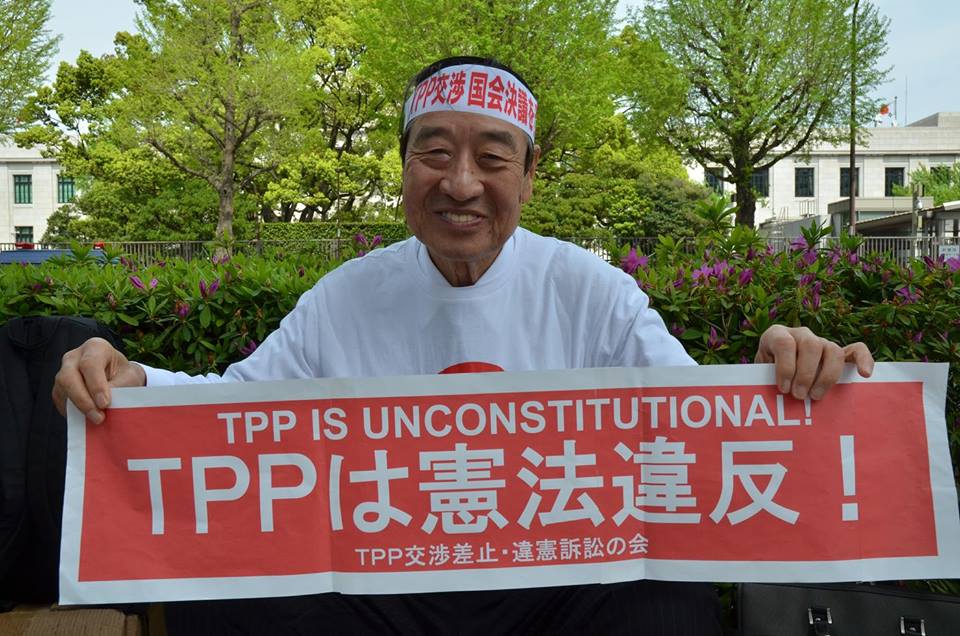More than 1,000 plaintiffs file lawsuit to keep Japan out of TPP
Japan Times | 15 May 2015
More than 1,000 plaintiffs file lawsuit to keep Japan out of TPP
KYODO, BLOOMBERG
More than 1,000 people filed a lawsuit against the government on Friday, seeking to halt Japan’s involvement in 12-country talks on a Pacific Rim free trade agreement, which they called “unconstitutional.”
A total of 1,063 plaintiffs, including lawmakers, claimed in the case brought to the Tokyo District Court that the proposed Trans-Pacific Partnership would undermine their basic human rights under the Constitution.
The lawsuit is led by Masahiko Yamada, 73, a lawyer who served as agriculture minister in 2010 as part of the Democratic Party of Japan government.
“The TPP could violate the Japanese right to get stable food supply, or the right to live, guaranteed by Article 25 of the nation’s Constitution,” Yamada, who abandoned his party in 2012 over then-Prime Minister Yoshihiko Noda’s push to join the TPP talks, said Thursday before the court filing.
The envisaged pact would benefit big corporations but would jeopardize the country’s food safety and medical systems, and destroy the domestic farm sector, according to the plaintiffs.
The litigation is another twist in efforts by Japan and the U.S., the top economies involved in the TPP, to expedite talks on the agreement that would cover about 40 percent of the world’s commerce.
An accord would deepen Japan’s dependence on farm imports and threaten its food security, Yamada said. Japan, which relies on imports for about 60 percent of its food needs, has cut its self-sufficiency target as the government expands trade deals.
An official at the Cabinet Office’s TPP task force declined to comment on the lawsuit.
While Japan and the U.S. have yet to reach a bilateral accord that would presumably pave the way for a 12-country agreement, the U.S. Senate advanced a measure Thursday that would allow President Barack Obama to accelerate approval of trade pacts.
Prospective members of the TPP have missed a series of deadlines since the U.S. said it would join the talks in 2009.The U.S. legislation granting trade promotion authority, or fast-track authority, is set to pass the Senate next week and move to the House. There, Obama has been courting reluctant Democrats to support the measure. He has said the authority is vital to wrapping up TPP negotiations.
Advocates have argued the far-flung trade deal would boost economic growth and create new jobs. The TPP could boost demand for Japan’s food exports among the 800 million people in the member nations, or 10 percent of global consumers, Agriculture Minister Yoshimasa Hayashi said last month. Prime Minister Shinzo Abe has set a target of doubling the country’s food exports to ¥1 trillion by 2020.
The plaintiffs said the TPP would change a number of rules and regulations concerning people’s lives “for the sake of the freedom and profits of global corporations.”
They claimed that an influx of inexpensive foreign products under the tariff-cutting deal would harm domestic producers and lower Japan’s food self-sufficiency ratio.
They also said the pact would push up prices for medicines and violate people’s right to receive proper health care by favoring big pharmaceutical firms.
The TPP member nations have been negotiating to introduce an investor-state dispute settlement clause which would give a multinational company the right to sue a state for compensation. The plaintiffs expressed opposition to the clause, saying it would jeopardize Japan’s judicial independence.
They also pointed out that the secret nature of the TPP negotiations violates the people’s right to know, as the document is confidential and the negotiating process will be kept undisclosed for four years after the agreement takes effect.
Under the TPP, Japan could be forced to cut beef tariffs to 9 percent from 38.5 percent and pork duty to ¥50 per kilogram from a maximum ¥482, Yamada said.
“That would be a fatal blow to Japanese livestock farmers,” said Yamada, who used to run cattle and hog farms in his hometown in Nagasaki Prefecture before becoming a lawmaker in the House of Representatives in 1993.
He said his dream of expanding his farms to become one of the country’s largest meat producers did not come true because a U.S. ban on soybean exports in 1973 sent livestock feed prices soaring, making his business unprofitable.
The TPP negotiating members are Australia, Brunei, Canada, Chile, Japan, Malaysia, Mexico, New Zealand, Peru, Singapore, the United States and Vietnam.






